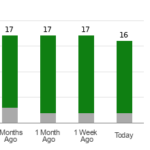Advancements in Application Development Platforms
Enterprises are adopting cutting-edge low-code/no-code platforms empowered by AI capabilities to craft intricate applications tailored to their specific requirements, states the ISG Provider Lens™ report.
Driving Forces Behind Enterprise Demands
In the present landscape, companies are exerting more pressure on low-code/no-code development platforms to facilitate the creation of sophisticated, enterprise-level software solutions. The ability to cater to the needs of non-technical users through intuitive interfaces and construct complex applications remains a key focus. AI plays a pivotal role in enabling these features.
AI Integration and Automation
AI extends its benefits across various phases of the low-code/no-code development cycle, facilitating automated decision-making, code generation, query resolution streamlining, and identification of security vulnerabilities. These capabilities assist enterprises in integrating AI and Machine Learning components in their applications. Notably, Generative AI (GenAI) simplifies the development journey by generating visual elements based on developer preferences or descriptions, thus easing the application-building process for non-technical users.
Evolution of Low-code Development
Low-code development platforms sought by companies offer robust version control, project management, and real-time collaboration capabilities. Security and compliance hold increasing significance, especially within highly regulated sectors, prompting enterprises to demand features such as data encryption, access controls, and adherence to industry standards.
Component-based Architectures and Collaboration
The emergence of component-based architectures in low-code platforms enables users to construct applications by simply dragging and dropping pre-built modules. This approach allows developers and users to create reusable components, share best practices, and ensure platform adaptability over time. Jan Erik Aase, partner, and global leader at ISG Provider Lens Research, underscores the role of low-code development in fostering enterprise collaboration through fusion teams aligning business objectives with technical solutions.
Adapting to Complex Requirements
No-code platforms have evolved to cater to intricate demands by introducing recent enhancements like hybrid development capabilities. These features empower enterprises to extend and customize software through coding when deemed necessary, offering flexibility while preserving the inherent advantages of no-code development.
The Emerging Trends
Apart from the core developments, the report delves into other low-code/no-code solution trends, embracing the surge in interest towards self-healing application functionalities and the expansion of ecosystems driven by third-party integrations.
© 2024 Benzinga.com. Benzinga does not provide investment advice. All rights reserved.




